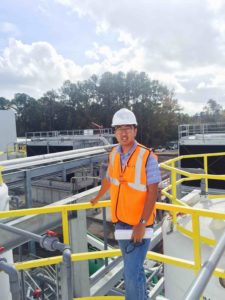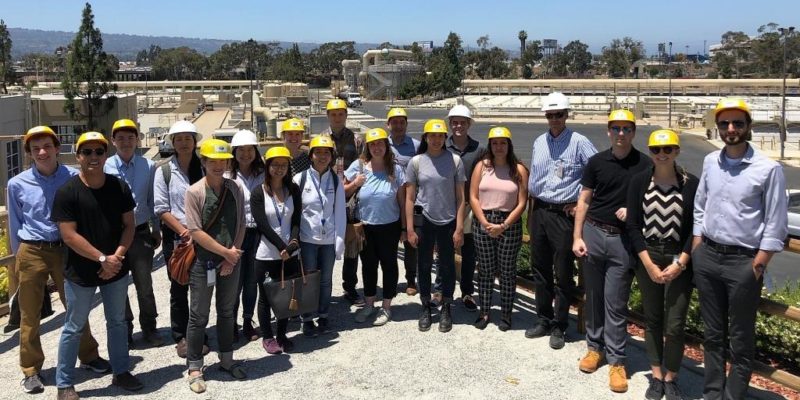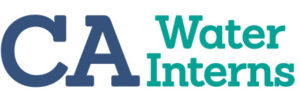California’s water and wastewater agencies need approximately 6,000 new workers every year and that number continues to grow as more and more water professionals retire.
Water careers provide an incredible opportunity for individuals who enjoy working with their hands, working outdoors and working as part of a larger team. Water careers offer great salaries and benefits; a positive work-life balance; job stability through any economy; and you’re doing a great thing for your community – protecting the supply of clean, healthy water.
With the launch of the new CAWaterInterns.org site, CWEA reached out to members and water professionals that started as interns to learn why they got involved in water and how their internship helped propel their careers.
 Weizhi Cheng
Weizhi Cheng
SRT Consultants
Water Resources Engineers
CWEA Students and Young Professionals Committee
When did you first know you wanted to work in the water profession?
I grew up in a heavily industrialized city in northern China. When I was a kid, we used to play on the bank of a river that had all sorts of color and smell. What we didn’t know was that the water was contaminated. Since this type of river was so common in the area, we just took it as a norm and a typical way of life. When I was in middle school, I had the opportunity to study abroad in Cambridge, UK. I was surprised at the stark contrast of the water quality at home and at Cambridge. This was the beginning; I wanted to help with water issues. After high school, I attended the University of Florida and enrolled in the environmental engineering program, which built the foundation of my water career.
How did you find out about internships in the water sector?
I found my first internship in junior year of college. I tried all sorts of methods to find any available internship opportunities. There are many ways such as: career showcase, online searching, friends and professors, and career centers at the University. However, what worked for me the most was networking. It comes down to exploring opportunities based on established relationships. Attending and presenting at conferences are great ways to network.
What has been your path to where you are today?
I don’t think there was a clear path that directed me to where I am today. There were a lot of trials and errors along the way to achieve my short term and long term goals. I was able to get here by taking advantage of good resources available to me, taking on risks and opportunities, and constantly trying to realign myself with my goals. Overall, the contributing factors that took me where I am today include going to a great college (Go Gators!) and enrolling in a program that I was passionate about, doing well in school, getting involved and networking, participating in research, setting high standards for myself and being kind to other people. Most importantly, have a good time doing whatever you do.
What is your advice to an intern entering this profession?
Be curious, be social and be proactive. I was an intern myself and I have been involved in the hiring of many interns at my previous job and at SRT Consultants. As an intern, you are likely new to the business and I think it is important for the intern to show his/her desire to learn about the profession, get to know the people in this profession, and be passionate and energetic about the your job. It is also the best way to find out if the company or the profession is a good fit.
When you hire interns for your company, what qualities do you look for?
My water career has been on the consulting side of the business. I like to look for someone who did well in college. It doesn’t have to be perfect but at least it shows that you are comfortable learning the technical knowledge in this profession. I’m also looking for good personality traits through casual conversation or involvement records. Because the ability to establish and maintain good relationships is very important in this profession. In the end, the goal is to provide our clients with excellent work and service.

Sami Hunkler
Participant Sanitation Districts of Los Angeles County (LACSD) Civil/Environmental Engineering Student Worker Program
Incoming Engineering Associate II
When did you first know you wanted to work in the water profession?
I first knew I wanted to work in the water profession when I became part of a school team working on an arsenic remediation project. I thoroughly enjoyed learning how theoretic course material could be applied to tangible systems. Additionally, I was struck by the direct impact to public quality of life, and realized I wanted to be in a field motivated by providing a public service.
How did you find out about the available internship?
I found out about the available internship at my university’s career fair.
What has been your path to where you are today?
I received a Bachelor of Science degree in Civil and Environmental Engineering, and completed two internships at Los Angeles County Sanitation Districts. The experiences I had during my internships inspired me to pursue a master’s degree in Civil and Environmental Engineering. Now, I am looking forward to soon beginning a full-time position at LACSD.
What is your advice to an intern entering this profession?
My advice would be to make connections with people during your internship, including both peers and mentors. I found it extremely valuable to establish relationships with people who are also entering this profession. This way I could talk to people making similar decisions, and receive other perspectives about internship experiences. The mentor relationships are useful for seeking advice, and knowing what your future could look like later in this profession. Since it is a fairly small community, working together in the future is a great possibility, especially for collaborating on some of the larger challenges in California’s water system!
About 20 students are hired each year in the Civil/Environmental Engineering Student Worker Program at LACSD. Participating students are placed in various sections and come together each week to share their work experience and hear technical presentations from some of LACSD’s over 200 professional engineers. Students obtain experience in areas such as: recycled water research and production, wastewater and solid waste design and operations, energy recovery, stormwater management, water and air quality, project management, planning and construction.
This program is very competitive. We don’t just get applicants from local schools, but from all over the nation. This year we hired students from Alabama, Illinois, and NC State. We also draw interest from all degree paths, with two of our students this year working on PhD’s.

We hire both undergraduate and graduate Civil/Environmental Engineering students, and typically hire one or two former student engineers each year for full-time positions. In 2018, the majority of our students are undergrads that are working in recycled water research and production, construction, wastewater and solid waste design and operations, structural design, energy recovery, wastewater collection systems, biosolids management, air quality, and reuse and compliance. Students tell us that they choose the LACSD student engineer program over other internship options because of our summer presentation series and the fact that they get to interact with and learn from student engineers attending other universities on a weekly basis, which is usually not an option that other engineering internships can provide.
We have nine program meetings in the summer that aim to provide students with a strong understanding of LACSD’s engineering work (below is a summary of one of our recent tours/presentations, I’ve also attached a picture). The last three meetings are longer lunch meetings in which each student gets to present their summer work to the other students.
Student engineers visit demonstration site that could become one of the largest water recycling programs in the world
During a tour of the JWPCP wastewater treatment plant in California which serves 3.5 million people and can treat 400 MGD, students got to see the construction of a $17 million water recycling plant demonstration facility that will initially purify 500,000 gallons of water each day.
If the demonstration project works and water scarcity issues continue as projected, a full-scale $2.7 billion plant will be built with annual operating costs of $129 million/year, resulting in water costs of approx. $1,600 an acre-foot (comparable to other new local supplies).
The full-scale program could become one of the largest advanced water treatment plants in the world as it would produce 150 million gallons/day of purified water that could replenish groundwater basins and provide water to 335,000 homes. – Alex Mena, Senior Engineer
Los Angeles County Sanitation Districts
 The CAWaterInterns.org website was made possible with the generous support of Water Career Pathways operated by West Valley College. The program is funded by the California Career Pathways Trust with an AB86 grant that was awarded to West Valley.
The CAWaterInterns.org website was made possible with the generous support of Water Career Pathways operated by West Valley College. The program is funded by the California Career Pathways Trust with an AB86 grant that was awarded to West Valley.
Find available internships or post your internship for free*.
*Free for public agencies.